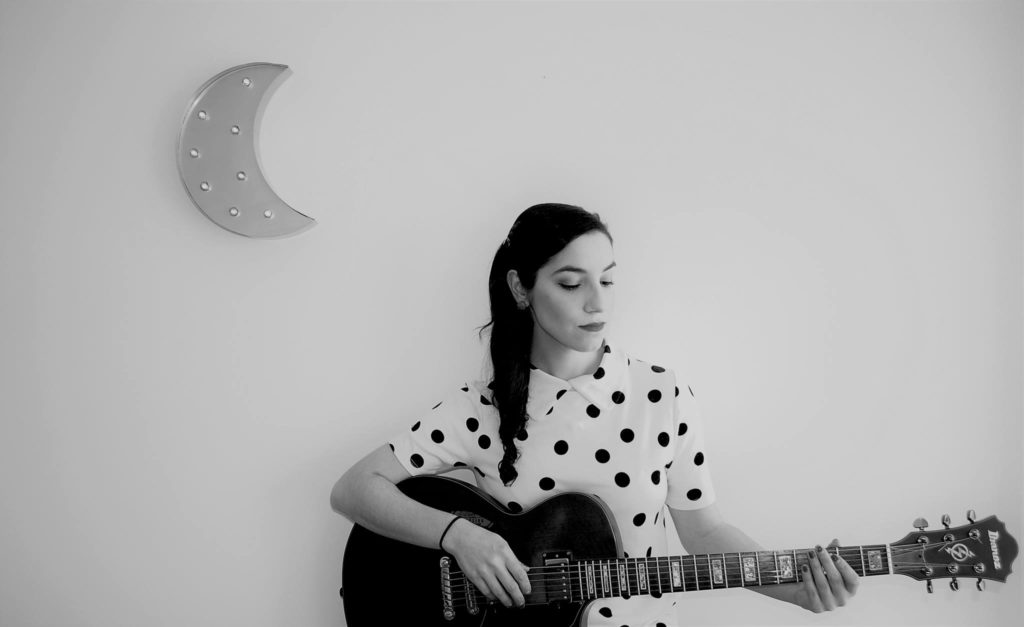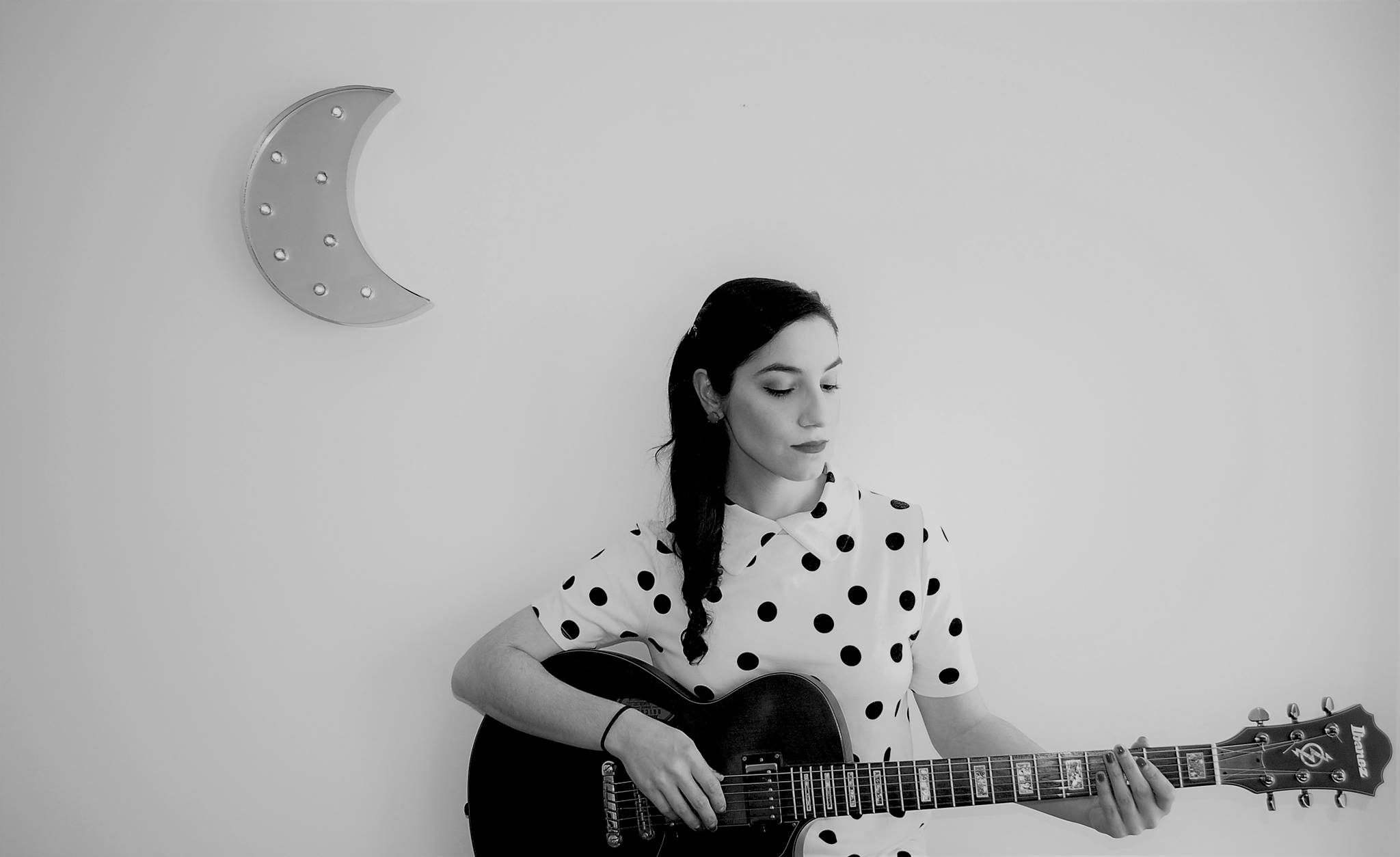A Guitarist Is…An Interview With Sarah Fard of Savoir Faire

A few months back Sarah Fard posted on Facebook about talking to guitarists about their craft, their influences and geeking out on their gear. The response was dynamic, varied and launched a conversational series that lived within the confines of Facebook, speaking with and highlighting musicians from all genres and walks of life. It was truly an exercise in wonderment to read about all these different artists within this Boston-centric community and see where there were parallels and also differences.
The Savoir Faire front woman’s social feed is always something worth following (check out her instagram here). Just coming off of the She Shreds riff a day challenge, presents a host of killer guitar lines and solos each day, but that isn’t out of the ordinary for the jazz infused singer songwriter’s feed. She is constantly putting up new arrangements of old originals and clips of ‘name that tune’. Its a real treat to check in every day and see what shakes out next.
She just announced that she would be hosting a playlist with some of those guitarists that she has previously featured and we thought it as good of a time as any to turn the tables around and see what influences Sarah and makes her tick musically. Give a listen to the playlist, bookmark it and check back in as it evolves and be sure to read on as we check in with Sarah Fard and her “A Guitarist Is…” series.
SF: A few things, actually. I felt that, while I had begrudgingly joined social media, I was finding a lot of diverse and AMAZING guitar players through the likes of Instagram. It further proved what I had long suspected- it’s not that men are more likely to play guitar and play well, they are probably just more likely to gain exposure. The same could be said of guitarists of different cultural or racial background, gender identities, style of playing- all of that! The icing on the cake was the article “The Death of the Electric Guitar.” While I understood what the author was driving home (more young people are drawn to electronic means of making music, reselling guitars leads to fewer new ones being sold, etc) there was one line that really bothered me: “There are no new guitar heroes.” Something to that sort. I call total shenanigans on that, and again- they exist, they just don’t get the attention they deserve.
Furthermore, the author pointed out that artists like Taylor Swift have remained inspiration for younger people (primarily girls) to pick up the guitar and I do think that’s wonderful. Still, it struck me that there is a gender divide in what males get to see as representations of themselves in the media, and what girls get to see. I fully appreciate the range of the guitar as an instrument, and one of the beautiful things about it is that you CAN be a master of your craft and play mostly rhythm or whatnot. However, it still irks me that our culture tends to only give young girls one model of a guitar player. Examples are hugely important. As a music educator, I know firsthand that for too long, literature and traditional lessons have not represented the population well. We only teach about the male, European composers- and often the ones that are no longer alive! Why are we not giving our young people new examples for inspiration? I want ALL of my students to realize that they can be any type of guitarist or musician they want. There’s no “girl” role or “boy” role in music. There shouldn’t be.
Lastly, I feel that social media can be very self absorbed at times. As musicians, we are urged to post and engage people. That’s cool. What I don’t like is when it just devolves to just me talking about myself all of the time or posting pictures of myself all of the time. It just doesn’t sit right with me. I already knew that I wanted to do something in response to the “no guitar heroes” theory, so social media seemed like a good medium for that. I could showcase the diversity in our Boston community, the extraordinary skill in every guitarist’s music, and have a chance to show what I believe in while not talking about myself! I hope that it at least drew some new fans for each musician who participated.
RLR: Do you think the exercise was eye opening for you at all as a performer, composer and player? What do you think you found most intriguing about other musician’s answers to your questions?
SF: What came to my attention was that, sure, there were a lot of name of guitarists that came back in replies that I expected to hear about when talking about our own personal guitar heroes. What was interesting, though, were the names that got repeated that I don’t believe have been praised in the mainstream as guitar heroes. One of those people was Rosetta Tharpe. She is finally getting the attention she deserves, but this made me realize that lots of people have known about her for quite some time, but the mainstream just never talked about her all that much.
There were quite a few mentions of David Gilmour, Jimi, Richards- but also a lot of love for the guitar solo from Smashing Pumpkin’s “Soma,” St. Vincent, and Nels Cline. Plus, artists I had not heard of beforehand. I think this proves that guitar heroes from the past and present are still very much inspiring- for all ages.
For me as a performer, I realized that some of my local guitar heroes started playing guitar far later than I would have guessed. I guess that means I need to start practicing more!
SF: The guitar is the palette for which I can compose my music from, and it’s my safety blanket on stage. It’s also the force that has kept me learning as I get older, and has pushed me to be better. It is a multi-layered instrument, which I love. I’m repeating myself here, but it truly is all of the things for me. When I perform solo, I have to play the chords and the bass and the solos on my own, so it is the whole band! I like to say that the guitar, for me, is the background, middle ground, and foreground for what I do.
RLR: Who are your musical inspirations (guitar or not) and why?
SF: Fiona Apple is always my inspiration, and has been my inspiration, for writing. No one can hold a light (is that the right phrase?) to her lyrics. Vocally, both Fiona and Ella Fitzgerald are huge for me. For guitarists, I am always going back to Joe Pass for his ability to lead and accompany, Matt Bellamy for his ever changing approach to the instrument, and anyone from Radiohead. They create music but they also create soundscapes that are just so beautiful, it fascinates me! St. Vincent has recently had me thinking about my instrument in new ways, too. If I think of my progress as a musician and who has always been staples for me, then it’s certainly Fiona Apple, Louis Armstrong, Ella Fitzgerald, Radiohead, Muse, No Doubt, Kimbra, Melody Gardot, The Police, The Beatles, Bowie, Sheryl Crow’s first few albums (Tuesday Night Music Club was the first CD I ever bought!)- I could keep going haha. I like to think that it’s all in there when I play. Oh, and Jewel was the reason that I ever wanted to play the guitar back in the 90’s. She has some wild finger style stuff, and I remain today to be a finger style guitarists regardless of style.
RLR: What is your setup?
SF: I mostly play my semi hollow Ibanez Artcore. I’ve really gotten into using a whammy bar, though- giving some songs a real David Lynchian sound! So, I’ve been using a Fender Strat on some tunes. I also have a nylon string Cordoba that I’ve been using a lot at home that I’d love to get on stage soon.
For amps, I go through a Vox or a Fender tube (a new addition to the family). Pedals have also really helped me get closer to the tone I want. I almost always have my SP Compressor on, and use my Boss Reverb a lot. I also have a Boss Distortion, a Voodoo Lab Tremolo, an Ibanez mini Tube Screamer, and an Electro-Harmonix Canyon Delay. I don’t use the Canyon to much yet- but it was the reverse effect that got me interested. Oh, and a JamMan loop for when I’m going solo!
RLR: What was one of the first things you learned on guitar?
SF: I think it was Let It Be, followed by Hey Jude.
RLR: This is obviously a community driven exercise, highlighting local musicians and all. What does that community mean to you, well just as a human being, and also as a performer?
SF: As I mentioned before, I am a music teacher, so community is a pretty huge thing. We want to be sure that our communities are fostering music so everyone has the opportunity to enjoy or participate in it. That means including everyone. I’m happy to see some changes happening, and there for sure will need to be more. If I am teaching everybody, then I better be darned sure that everyone has equal access to music and music making!
We also live in a world where so many communities are online. That’s a wonderful thing in its own right (see again my comments on Instragram and the guitar community there) but nothing replaces people who are right there with you. Community is people that grow with you. As a performer, I have been so lucky to have been welcomed in the Boston music community, and very recently the Worcester music community. You not only discover great music, but find people to connect with on other levels, too. The people within these music communities are so helpful, and I learn from them. Also, if it had not been for the open mics in the Boston and Cambridge area, I would have never found my footing here as an artist. So I am so thankful for that community.
RLR: So…what comes next? Is there more to be seen for the “A Guitarist Is” project?
SF: Yes! There will be monthly playlists for a while, but I plan on curating some shows for the performers that I interviewed. I hope that this will really bring the idea front and center within the community, to see these performers live and see all that they represent. I haven’t started planning that yet, though, because I am working towards my own album release and aiming for this winter. So, stay tuned!

